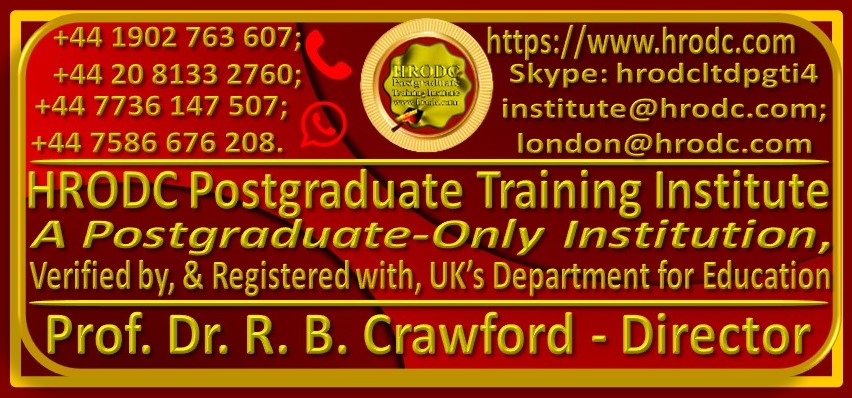Prof. Dr. R. B. Crawford is
Course
Coordinator. He is the Director of HRODC Postgraduate Training
Institute, A Postgraduate-Only Institution. He has the following
Qualifications and Affiliations:
Doctor of Philosophy {(PhD) {University College
London (UCL) - University of London)};
MEd Management (University of Bath);
Postgraduate (Advanced) Diploma Science Teacher
Ed. (University of Bristol);
Postgraduate Certificate in Information Systems
(University of West London, formerly Thames Valley University);
Diploma in Doctoral Research Supervision,
(University of Wolverhampton);
Teaching Certificate;
Fellow of the Institute of Management
Specialists;
Human Resources Specialist, of the Institute of
Management Specialists;
Member of the Asian Academy of Management (MAAM);
Member of the International Society of Gesture
Studies (MISGS);
Member of the Standing Council for Organisational
Symbolism (MSCOS);
Member of ResearchGate;
Executive Member of Academy of Management (AOM).
There, his contribution incorporates the judging of
competitions, review of journal articles, and guiding the
development of conference papers. He also contributes to the
Disciplines of:
Human Resources;
Organization and Management Theory;
Organization Development and Change;
Research Methods;
Conflict Management;
Organizational Behavior;
Management Consulting;
Gender & Diversity in Organizations; and
Critical Management Studies.
Professor Dr. Crawford has been an Academic in
the following UK Universities:
University of London (Royal Holloway), as
Research Tutor;
University of Greenwich (Business School), as
Senior Lecturer (Associate Professor), in Organisational
Behaviour and Human Resource Management;
University of Wolverhampton, (Wolverhampton
Business School), as Senior Lecturer (Associate Professor), in
Organisational Behaviour and Human Resource Management;
London Southbank University (Business School), as
Lecturer and Unit Leader.
His responsibilities in these roles included:
Doctoral Research Supervisor;
Admissions Tutor;
Postgraduate and Undergraduate Dissertation
Supervisor;
Programme Leader;
Personal Tutor.
















